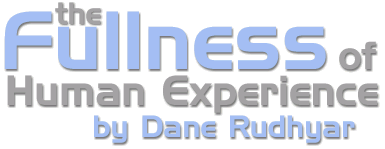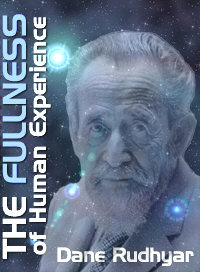 |
| Home | Bio | Art | Music | Literature | Civilization & Culture | Philosophy of Wholeness | Theosophy & Spirituality | Astrology |

CHAPTER SIX
The Formative and Separative Operations of Mind - 7 Personhood, however, can operate negatively — thus against the neutralization of karma — as well as positively. The ancient failure which produced the resurgence of karmic memory-patterns (subconscious though that memory is) may be repeated, and the patterns made less easily erasable; or ancient hate may be wiped out by Compassion. To repeat, personhood is what the Godhead envisioned as the Solution to the problems left by ancient failures; but whatever has to apply this Solution has to be free not to do so. . .and thus free to fail once more. It is a test of strength — thus, of the quality of the desire factor as it operates in a situation difficult to meet. It is also a test of the clarity of the mind. A clear mind — in the spiritual Buddhistic sense of the term "clear" — is a mind able to overcome the inertial power of the habits developed when the person was mainly controlled by the patterns of his or her culture, and also by the still more basic impulses derived from biological functioning. Mind indeed finds itself in a difficult and precarious situation as the evolution, and especially the individualization of personhood proceeds, for it has to deal with conflicting forces. It has to deal with still very strong biological compulsions (hunger, sex, desire for self-multiplication and expansion of territory) and also with sociocultural imperatives impressed since birth upon the nervous system, brain cells, muscles, and metabolic functions. As participant in the collective activity and the psychism of a culture, the mind factor in the experience of personhood may have to fight against biological urges when cultural taboos or ascetic religious ideals are still powerful factors in a quasi-tribal environment. In any case, mind has to use symbols, words, and gestures belonging to the particular culture (or today the generational subculture) which had deeply influenced or controlled its growth, intellectual habits, and emotional responses or expectations. Mind has to deal with the karma of other persons with whom it is intimately related through life's shared purposes' and activities, as well as with the personal karma of the ancient past. The situation is indeed highly confusing because it repeatedly presents a variety of options whose validity can hardly be rationally determined. Though there is a deeply felt urge to take free and individual decisions, the decisions taken are not really free because they constitute the convergences of many event-lines whose origins and developments cannot be known by the mind of a normal person. What seems to be the relatively unimportant choice of a person moved unexpectedly by the rise of a strong desire may spark an unexpectedly wider series of repercussions. In any "personal" choice, much more may be at stake than the mind of a person advancing on the way of individualization or on the subsequent Path of discipleship; nevertheless, mental processes are always operating in any human situation. They operate in and through the immensely complex interconnection of cellular processes, chemical-molecular transformations, and electromagnetic currents, often conflicting with one another. Because of such a situation, mind has very often been considered the enemy of spiritual development and the "slayer of the real." Mind has been compared to a noisy group of restless, chattering monkeys; and yoga has been developed to "control the operations of the mind." The usually unasked question, however, is: what could control these inconsistent random motions of a mind wandering from word to word, image to image, concept to concept, method to method, and even at times seemingly from purpose to purpose? A traditional European psychologist-philosopher may answer: the will. But as will is a power, there must be a source to that power — some kind of being using it, directing it along some kind of path. From the Christian point of view, this source of will is the God-created Soul. The authors of the Upanishads presumably thought of it as atman. From, the point of view of the philosophy of operative Wholeness the will, in its totally impersonal holontological aspect, is the Movement of Wholeness itself. It is the power that, in the cycle of being, drives one type of situation to the next. It is what the Zen master, asked to define Zen, may have meant when he said: "Walk on." But when the level of individualized personhood is reached, a subject, having detached himself from the cyclic Movement, assumes that he does the moving and the walking because he feels free to choose the direction of the walking. The choice, however, is determined by the desire to walk either with or against the tidal movement of evolution. And at a stage of evolution (in the symbolic mid-Afternoon), the trend toward Unity is becoming increasingly powerful, though not as yet dominant. The subject, however, having detached himself from the Movement, may be unaware of and unconcerned by the direction of the motion. He may be too busy proving to himself and to others his independence from the culture that formed his mind, or even (as an adept proud of his abnormal powers) in perfect control of his biological and psychic energies. In the experiences of such an individualized person, the mind factor becomes a battlefield in which various desires are contending for mastery of the mental processes: the desire for a more abundant physical and emotional life, with greater happiness and/or comfort; the desire for wealth, social prestige, fame, power; the desire either to be more original and unique as an individual, or (out of sheer weariness and confusion) to renounce individual choice in order to find tranquility and what seems to be security by conforming to an ancestral tradition or a new mass-movement. Yet beyond these desires, the mysterious pull of a state of being transcending this "human, all too human" situation may also be recognized by a mind having been impressed in quieter moments by books or associates presenting this transcendent state not only as an ideal or Utopia, but as an actualizable possibility of existence. In the midst of this conflict of desires, the karmic pattern of some ancient failure that once had occurred at a similar or related phase of the cycle of personhood (or a subcycle thereof) may operate. It may manifest as the resurgence of some unfinished, situation seeking fulfillment, or as a sense of futility and depression, or in a variety of either clearly related or (more often) seemingly unrelated events. Mind has to deal with all of these factors. Though it is the theoretical servant of the subjective factor seeking concrete fulfillment through the effective use of available energy, mind may cling to some old formula of its culture or religion, as to a plank of salvation. This may even further confuse the situation on the battlefield where desires are fighting against one another for the strategic use of the available power of the mobilized will. Moreover, once the subjective factor in the experience is detached from the evolutionary Movement, the now isolated subject finds itself dependent upon the forms and procedural techniques of the mind. When the person is operating at the ego level, trying to pass from compelling biological urges to sociocultural desires, the situation may not be too confusing for the mind; options tend to be limited by a for-or-against, either-or dilemma. But when the traditional patterns and the future development of the culture are sharply criticized by the mind in the impersonal terms of their validity as principles of organization, and at the same time are no longer able to satisfy the personal desires of the experiencing subject, the whole person may be involved in a difficult cathartic process of readjustment. Taking a resolute new step leading to a new phase in the development of personhood may require either a situation-altering external event, or a clearly focused and undismissible feeling-awareness of the reality of a transhuman stage of development just ahead. Such a realization may be impressed upon the mind in various ways, but it implies the directed activity of a factor operating at the culture-transcending Pleroma level. This factor is likely to be a particular Pleroma being to whose field of superpersonal planetary activity the individual in crisis potentially belongs. Such a being helps the struggling individual to realize the essential place and function which the individualized subjective self potentially occupies in the Pleroma. The so often mentioned Higher Self is that place and function. It refers to a spiritual Quality which is one of the many components of the "Soul" of the Earth-being — or, symbolically speaking, one among the myriad of Letters of the divine Word (Logos).(3) As a truly individualized self, the subjective factor in personhood is only a single Letter, which in itself does not reveal the meaning of the Word (the creative Logos), yet which is indispensible to the fullness of that meaning. Such a Word, with its billions of Letters, constitutes the archetypal Solution envisioned by the Godhead in the Midnight phase of the Movement of Wholeness. Every fully individualized person is potentially one of these Letters. But one can significantly speak of "letter" only when one is aware of the "word" of which the letters are component parts. Similarly, an individualized person realistically points to and actually participates in the divine Solution, personhood, only when integrated with all other such persons. 3. See The Planetarization of Consciousness, pp. 127-28. Return By permission of Leyla Rudhyar Hill Copyright © 1986 by Leyla Rudhyar Hill All Rights Reserved.  Web design and all data, text and graphics appearing on this site are protected by US and International Copyright and are not to be reproduced, distributed, circulated, offered for sale, or given away, in any form, by any means, electronic or conventional. See Notices for full copyright statement and conditions of use. Web design copyright © 2000-2004 by Michael R. Meyer. All Rights Reserved. |
 |
